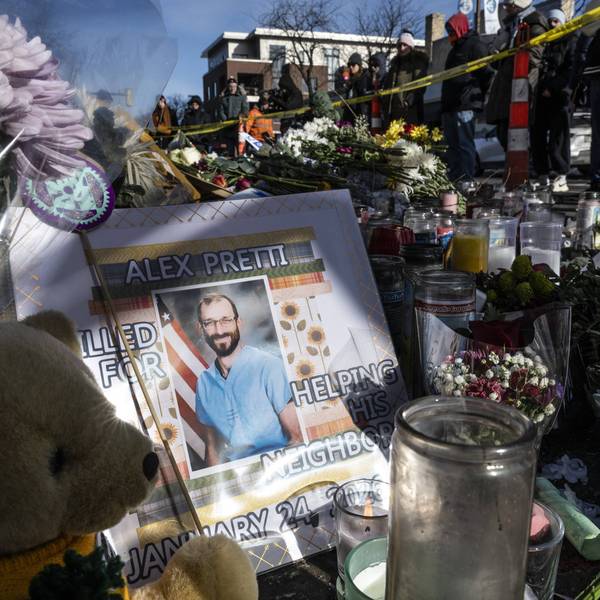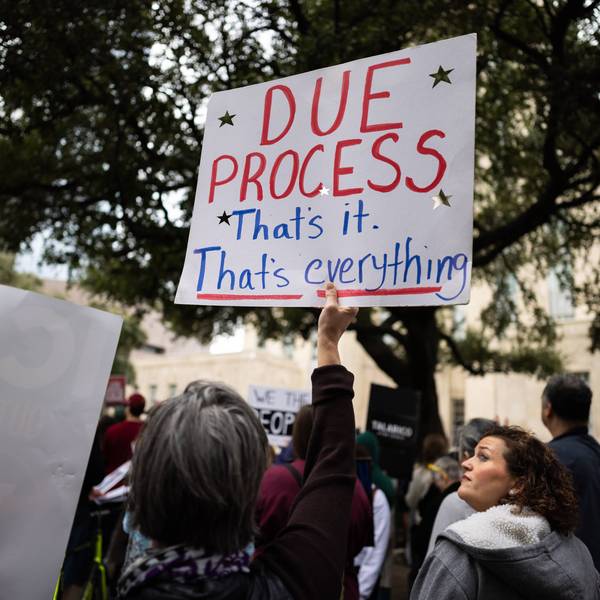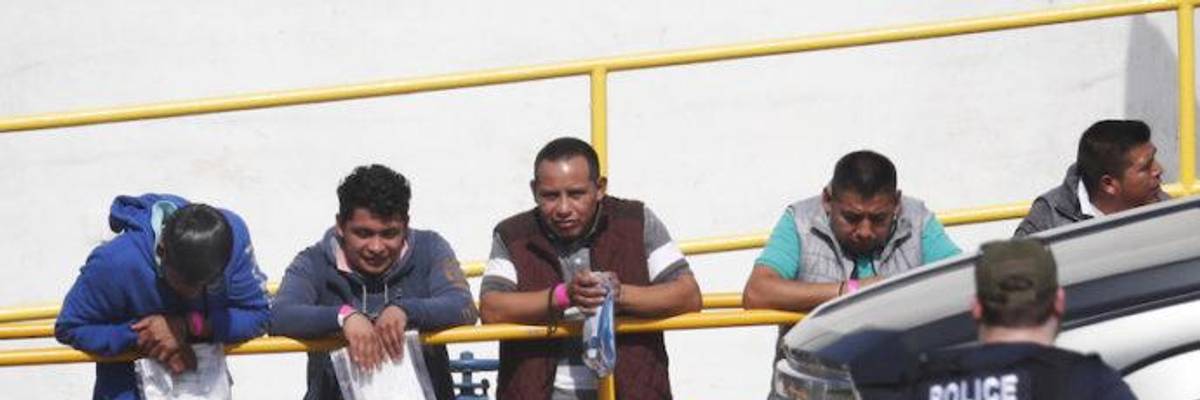There is seemingly no limit to the cruelty President Trump inflicts on immigrants. Just days after a horrific mass shooting claimed the lives of 22 people in the immigrant-rich border town of El Paso, Texas, the Trump administration carried out the largest workplace raids in the nation's history. Immigration and Customs Enforcement (ICE) agents rounded up nearly 700 people in cities across Mississippi on Wednesday.
At a meat-processing plant run by Koch Foods Inc. in the small town of Morton, those who were rounded up filled three buses. A local news outlet described how a "tearful 13-year-old boy whose parents are from Guatemala waved goodbye to his mother, a Koch worker, as he stood beside his father." The report described how "some employees tried to flee on foot but were captured in the parking lot." So far, it is not known what will happen to children whose parents were wrenched away.
The raids ought to be seen as part of the Trump administration's family separation policy designed to literally traumatize children and parents into leaving the U.S. and deter others from seeking refuge here. At a time when agency heads are telling lawmakers that immigrant detention centers are so overcrowded they are unable to provide proper food and hygiene to detainees, why is Trump adding hundreds more people into the mix? The answer is obvious: because immigrants are the No. 1 enemy in Trump's America. The pain of immigrants is a weapon in Trump's hands.
The shooting in El Paso has to be viewed through the same lens. Trump has attempted to assert plausible deniability in his connection to the massacre, refusing to acknowledge his role in fomenting the hate that drove the shooter to spray dozens of bullets into a border-town store. He took umbrage at former President Barack Obama for saying, "We should soundly reject language coming out of the mouths of any of our leaders that feeds a climate of fear and hatred or normalizes racist sentiments." Trump retorted childishly on Twitter, "Did George Bush ever condemn President Obama after Sandy Hook. President Obama had 32 mass shootings during his reign."
But of course, Trump couldn't admit the fact that mass shooters during Obama's presidency did not echo the 44th president's rhetoric. In his online manifesto, the El Paso shooter described a "Hispanic invasion of Texas." And in his discussions of the U.S.-Mexico border, Trump used the word "invasion" at least two dozen times. That is an ideal word to signal to his followers that it is open season on immigrants.
Trump seems to have a two-prong strategy: first, to goad government agencies to persecute immigrants through formal mechanisms, and then to downplay his role in giving his supporters the impression that they are free to attack immigrants through informal means, such as verbal and physical abuse and hate crimes.
Just a few months ago, at a political rally in Florida, Trump asked the crowd that had gathered: "How do you stop these people? You can't," he said, referring to immigrants seeking refuge in the U.S. A member of the audience yelled back, "Shoot them." Instead of expressing horror and chastising the audience member for suggesting murder, Trump smiled and joked that "only in the Panhandle can you get away with that statement." To this, the crowd cheered wildly. Given the overlap between Trump's supporters and gun owners in the nation, it was inevitable that Trump's stoking tactics would result in actual violence.
In writing about Trump's role in the Tree of Life Synagogue attack in Pittsburgh last year, Pacific Standard editor Jared Keller explained that the president's signaling "is known in political science circles as 'stochastic terrorism,' the use of mass communication to 'incite random actors to carry out violent or terrorist acts that are statistically predictable but individually unpredictable.'"
Trump's incitement of terrorism has been quite effective. In late July, his FBI director, Christopher Wray. admitted to Congress during a hearing that "a majority of the domestic terrorism cases we've investigated are motivated by some version of what you might call white supremacist violence." In the wake of the El Paso shooting, a top-level source told CNN, "Homeland Security officials battled the White House for more than a year to get them to focus more on domestic terrorism." What's more, "The White House wanted to focus only on the jihadist threat which, while serious, ignored the reality that racial supremacist violence was rising fast here at home. They had major ideological blinders on."
Trump supporters continue to back the president, not in spite of his racist rhetoric and incitement of violence, but because of it. It is difficult to admit that we live in a country that has a racist faction so big that it is capable of delivering an election--and perhaps a reelection--to a demagogue. It is a notion that is paralyzing to many of us. But we must not only confront this fact, we must work to make racism an ugly notion once more.
Texas congressman Joaquin Castro has the right idea. After the El Paso shooting, he tweeted the names of Trump's top donors in his district and listed all 44 of those who had given the Trump campaign the maximum allowable donations this year. In writing about how "[t]heir contributions are fueling a campaign of hate that labels Hispanic immigrants as invaders," Castro's goal was to shame Trump's enablers and link them to the violent outcome of the president's words.
Predictably, there was hypocritical pushback from Republicans. Sen. Ted Cruz replied, saying that Castro's tweet amounted to "hateful partisan rhetoric," and accusing him of "vilifying & doxxing" Cruz's constituents. Cruz made no mention of Trump's hateful partisan rhetoric. Like all Republican lawmakers who support the president, openly or implicitly, Cruz is part of the problem and deserves to also be shamed.
It is crucial that Trump's critics couch their criticisms in nonviolence. All it takes is one incident of violence or one call for violence from the left to deliver a rhetorical victory to the right, no matter how statistically insignificant it may be in comparison to the right's actual and rhetorical violence. Much has been made recently of protesters' angry and violent statements outside Senate Majority Leader Mitch McConnell's house. It matters little if such statements are the exception rather than the rule, given that the right-wing megaphone disproportionately amplifies them. The strongest moral high ground is one that is steadfastly nonviolent. It makes the verbal shaming of Trump's racist enablers far more effective.
In the meantime, direct action--including confronting the government machine of immigrant raids, detentions and deportations--must continue unabated. A powerful example of this are the nationwide actions by members of the Jewish organization Never Again Action and the immigrant rights group, Movimiento Cosecha, who have surrounded and confronted ICE offices and detention centers in various cities. The historical memory of Jews in challenging the persecution of immigrants and working alongside immigrant groups is exactly the type of solidarity we need in this moment.
A similar solidarity has been on display by Japanese-Americans whose ancestors survived the internment camps during World War II. Immigration lawyers also are hard at work around the nation in forming community legal defense teams to stop deportations, and mayors of sanctuary cities have welcomed refugees.
Taken together, these actions are throwing wrenches in Trump's large-scale project of persecution, even if it seems that we are in the midst of a losing battle for the soul of the nation. We are going to require deep reserves of patience, persistence and militant, nonviolent resistance to Trump, Trumpism, racism, white supremacy and violence. That is the only way we can win.




